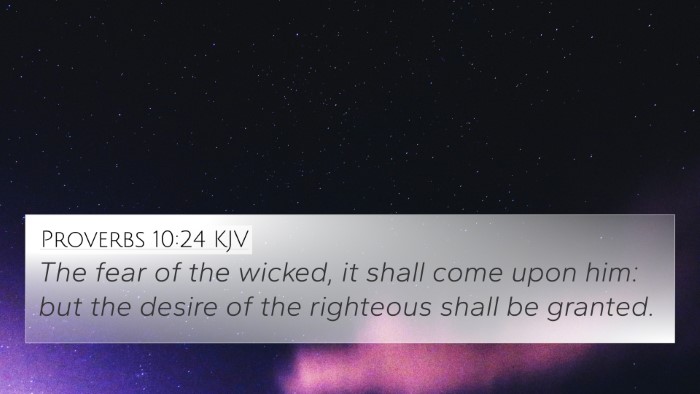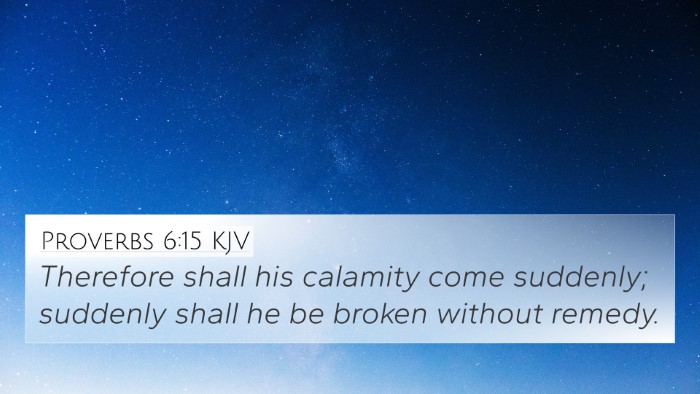Understanding Proverbs 1:26
Verse: "I also will laugh at your calamity; I will mock when your fear cometh."
Summary of Proverbs 1:26
Proverbs 1:26 presents a stark warning regarding the consequences of ignoring wisdom and guidance. This verse encapsulates the theme of retribution associated with the rejection of divine counsel. It illustrates how wisdom, personified, expresses its response to those who have disregarded her voice and embraced folly. Below, we explore its meanings through insights gathered from notable public domain commentaries.
Matthew Henry's Commentary
Matthew Henry emphasizes the seriousness of rejecting wisdom. He points out that wisdom's laughter at calamity serves as a divine response to those who choose folly over understanding. While wisdom earnestly calls out for individuals to heed its guidance, those who ignore it invite their own misfortune. The laughter here symbolizes the irony of their situation; they have neglected the very thing that could have saved them. This role reversal highlights the truth that choosing a path devoid of wisdom ultimately leads to regret.
Albert Barnes' Commentary
Albert Barnes reflects on the implications of wisdom’s mockery during the time of calamity. He interprets the verse as indicating that those who resist the call of wisdom will face dire consequences and, in their desperation, find no solace in the wisdom they once spurned. This reaction from wisdom underscores the reality of divine judgment—mocking their fears serves not only as a consequence but also as a sober reminder of the importance of heeding wisdom when it is presented. The absence of wisdom results in vulnerability to calamity.
Adam Clarke's Commentary
Adam Clarke delves deeper into the nature of the "fear" that wisdom speaks about. He interprets "fear" as the apprehension that overtakes individuals when faced with life’s dangers and adversities. Clarke notes that this fear often arises from past choices made in willful ignorance and rebellion against wise counsel. Wisdom's laughter is not mere mockery; it serves as a profound reminder that wisdom's absence can lead to tragic outcomes. The verse serves as compelling evidence that the wise and the foolish experience very different realities based on their responses to wisdom's call.
Connections to Other Bible Verses
Proverbs 1:26 connects with several other scripture references that reinforce its themes of wisdom, folly, and consequences. Below are the notable cross-references:
- Proverbs 1:23: "Turn you at my reproof: behold, I will pour out my spirit unto you, I will make known my words unto you."
- Job 22:21: "Acquaint now thyself with him, and be at peace: thereby good shall come unto thee."
- Proverbs 29:1: "He, that being often reproved hardeneth his neck, shall suddenly be destroyed, and that without remedy."
- Isaiah 1:28: "And the destruction of the transgressors and of the sinners shall be together, and they that forsake the Lord shall be consumed."
- Hosea 4:6: "My people are destroyed for lack of knowledge: because thou hast rejected knowledge, I will also reject thee."
- Romans 1:22: "Professing themselves to be wise, they became fools."
- Matthew 7:26: "And every one that heareth these sayings of mine, and doeth them not, shall be likened unto a foolish man, which built his house upon the sand."
- Galatians 6:7: "Be not deceived; God is not mocked: for whatsoever a man soweth, that shall he also reap."
- James 3:13: "Who is a wise man and endued with knowledge among you? let him shew out of a good conversation his works with meekness of wisdom."
- Psalm 37:13: "The Lord shall laugh at him: for he seeth that his day is coming."
Thematic Connections
The themes in Proverbs 1:26 resonate deeply throughout the Bible, showcasing a pattern where wisdom calls individuals to pursue righteousness and understanding while warning of the pitfalls of ignoring such guidance. Inter-Biblical dialogues reveal the sustained emphasis on the consequences of ignorance against divine insights and the mockery that follows calamity.
Conclusion
Proverbs 1:26 serves as a chilling reminder of the consequences associated with rejecting wisdom and guidance. The laughter of wisdom in the face of calamity should inspire a profound sense of urgency to seek and adhere to wisdom. By understanding this verse and its connections to the broader biblical narrative, individuals are urged to reflect on their choices and pursue a path illuminated by divine instruction.
Bible Study Tips
For those looking to explore the connections between Bible verses, consider using the following methods:
- Utilize a Bible concordance to locate similar themes and verses.
- Engage in cross-reference Bible study to explore the interconnections.
- Employ a Bible cross-reference guide for structured study.
- Identify links between the Old and New Testament to enhance understanding.
- Use tools and resources dedicated to comprehensive Bible cross-reference.
By these means, the exploration of wisdom, folly, and their resultant consequences can deepen our understanding of God's word and the importance of heeding His call.








